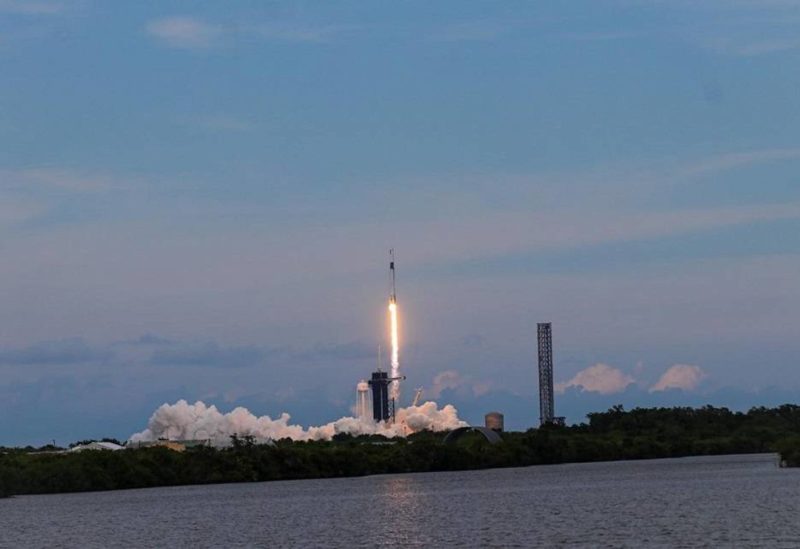
Saudi Arabia’s first astronauts in decades, Rayana Bernawi, and Ali Al-Qarni, rocketed toward the International Space Station on Sunday. (SPA)
Saudi Arabia’s first astronauts in decades, Rayana Bernawi, and Ali Al-Qarni, rocketed toward the International Space Station on Sunday.
SpaceX launched the crew, led by a retired NASA astronaut now working for the company that arranged the trip from Kennedy Space Center. Also on board: a US businessman who now owns a sports car racing team.
They should reach the space station in their capsule Monday morning; they’ll spend just over a week there before returning home with a splashdown off the Florida coast.
Bernawi, a stem cell researcher, became the first woman from the Kingdom to go to space. Al-Qarni is a fighter pilot with the Royal Saudi Air Force.
They’re the first from their country to ride a rocket since a Saudi prince launched aboard shuttle Discovery in 1985. In a quirk of timing, they’ll be greeted at the station by an astronaut from the United Arab Emirates.
“Hello from outer space! It feels amazing to be viewing Earth from this capsule,” Bernawi said after settling into orbit.
Added al-Qarni: “As I look outside into space, I can’t help but think this is just the beginning of a great journey for all of us.”
Rounding out the visiting crew: Knoxville, Tennessee’s John Shoffner, former driver and owner of a sports car racing team that competes in Europe, and chaperone Peggy Whitson, the station’s first female commander who holds the US record for most accumulated time in space: 665 days and counting.
The mission aims to conduct scientific and research experiments that can help strengthen the Kingdom’s global position in the field of space exploration, serve humanity and highlight the role of Saudi research centers.
During their trip, the two Saudi astronauts will carry out 14 research and scientific experiments in a microgravity environment, including three educational awareness experiments on the ISS. The experiments will focus on human research, cell sciences, and artificial cloud seeding.
King Faisal Specialist Hospital and Research Center (KFSH&RC), headed by Dr. Khalid Abu Khabar, Dr. Wejdan Al-Ahmadi and Dr. Edward Hitti and the Saudi Space Commission (SSC) will supervise the cell sciences experiment. They will monitor how the inflammatory response changes in space and the resulting changes in the lifespan of the messenger ribonucleic acid (mRNA) between space and Earth.
The King Fahd University of Petroleum and Minerals, headed by Dr. Ashraf Farahat, and in cooperation with the SSC, will supervise the cloud seeding experiment, which aims at simulating the process used in the Kingdom and many countries to increase rates of precipitation.
The experiment will help scientists and researchers come up with new methods to provide suitable conditions for humans to live in space colonies on the surface of the Moon and Mars. The experiment will help improve researchers’ understanding of cloud seeding technology that helps increase rainfall in several countries.
Saudi Arabia’s Nebula Research and Development, led by Dr. Bader Shirah, in cooperation with the SSC, will conduct six experiments in the field of human research to learn about human adaptation to spaceflight, its safety on the brain and to understand the effects that occur on human health while in space.
During these experiments, the functions of human organs and vital systems will be tested in microgravity, such as measuring blood flow to the brain, assessing intracranial pressure and electrical activity of the brain, and monitoring changes in the optic nerve.
Moreover, experiments will include taking blood and biological samples to examine the vital signs associated with spaceflights, and mapping changes in the length, structure, and epigenetics of genes.
The Kingdom’s male and female students will participate in scientific experiments aboard the ISS, to enhance cognitive awareness of space science and its contribution to improving the quality of life on Earth.
Students will be able to communicate with the Saudi astronauts directly by conducting their experiments together. The process will be held in cooperation with the Ministry of Education, King Abdulaziz and his Companions Foundation for Giftedness and Creativity “Mawhiba”, Riyadh schools, and Misk schools.
The mission is part of the Kingdom’s astronauts’ program, which is one of the programs that aims, in its first phase, to send two Saudi astronauts, a male and female, on a manned spaceflight to the ISS.
The program is expected to consolidate the Kingdom’s position and place it among leading countries, inspiring future generations in space technologies, promoting scientific research in various fields of space, and strengthening national partnerships and cooperation with relevant authorities.
The program bears special significance in achieving the Kingdom’s aspirations and goals of its Vision 2030.
The program aims to activate scientific innovations in space sciences. This will reflect positively on the future of the industry and the country. It focuses on the importance of developing skills, such as increasing national interest in science, technology, engineering, and mathematics (STEM) graduates and scaling-up investment in their potentials and developing human capital in accordance with the objectives of Vision 2030 by attracting talents and developing the necessary skills.
The launch of this program will pave the way for the Kingdom’s ambitions in the field of space exploration, especially since it is able to conduct its own research independently.
This ambition is reinforced by the Kingdom’s previous achievements in space flight. Through the program, it aspires to enable more distinguished and talented citizens to unleash their capabilities and compete on the local and global levels.